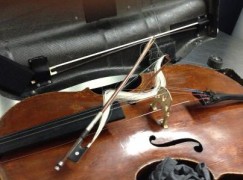Three heads of opera are facing the consequences of their recent conduct. What the three have in common is their look of bewilderment.
Alexander Pereira does not understand why the La Scala board has slashed his contract to a humiliating 18 months.

Peter Gelb at the Met cannot begin to understand why his musicians and crafts unions are winning the public opinion war.
And Ian Campbell, having worked 30 years to put San Diego Opera on the map hasn’t a clue why people won’t let him shut it down.
Pereira thinks he’s perfectly within his rights to shift loss-making productions from his last job, in Salzburg, onto his new post in Milan. Gelb sees nothing wrong in sharing information with media that he won’t release to the unions. Campbell could not grasp there might be a problem in hiring his then-wife on an inflated six-digit salary.
What the three men have in common is hubris.
In charge of a house of illusions, an opera manager can quickly lose touch with reality. An inflated self-worth takes over, accompanied by a sense of siege. Gelb sees the world in terms of allies and enemies. Pereira likes to enjoy life on a grand scale among oligarchs. Campbell in San Diego saw the opera as himself: if he was ready to retire, the opera might as well shut down.
Few people have spoken up in their defence because none of the three is what you might call a people person. Their problems are not so much operatic as isolationist. Each of them has walled himself in.
Now there are opera chiefs in Vienna, London, Munich, Amsterdam and multiple festivals who go about their business without making public proclamations or seeking attention, without imagining that the real opera takes place in their office, rather than on stage. In a bad week for opera, it is worth reminding ourselves that there are some outstanding managers out there.
Having written one book about Covent Garden and another about the music industry, I have no doubt that opera houses can be run honestly, openly and with an absence of hysteria. What is certain is that when the manager hits the headlines, management has failed.
And that’s a sign that neither Pereira, nor Gelb, nor Campbell is psychologically equipped to recognise.


You can watch the National Youth Orchestra of Germany and the German National Youth Ballet for free on the Berlin Philharmonic site. But they do require registration and may bombard you with offers. Click here.
The Canadian violinist Leila Josefowicz has withdrawn from the Proms. She was due to give the UK premiere of Luca Francesconi’s concerto, Duende – The Dark Notes, on August 7.
No reason has been given. Maybe she doesn’t like the piece, which has been written for her.

UPDATE: She’s having a baby around that time, her third. Congratulations.
The embattled Alexander Pereira has accepted the offer of the Scala board to be an interim director for a year, resigning on December 31, 2015. It is a humiliating climbdown for the director, sweetened by a reported salary of 40,000 Euros a month. He may still hope that a successful year might persuade the board to give him an extension, but that seems unlikely.
Pereira was responsible for persuading Riccardo Chailly to return to Milan as chief conductor. Will Chailly hold to his agreement?
First indications are that Maestro Chailly is playing his own game, the long game…

I’ve been spending time for sinfini with Yundi Li, the most famous and popular pianist in China, outshining Lang Lang and all others on social media. Yundi has never met Lang Lang… I discover that he cannot bring himself to mention his rival by name.

Yundi does things his way. He tours China with a programme of Beethoven sonatas, with a Chinese song, The Clouds Follow the Moon, as encore. Watch him play it here.
He’s an interesting, introspective artist, not excessively preoccupied with publicity and image. ‘The media,’ he says, ‘they work for themselves.’
During our conversation (which we have subtitled in Chinese for his home audience), he was happy to take up the instrument that first got him interested in music. Click here to watch the video.

There has been a slight easing of the draconian US ban on entering the country with prohibited bits of African elephant. The U.S. Fish and Wildlife Service (USFWS) has told Customs official to go easy on violin bows, provided certain other conditions (see below) are fulfilled.
It’s an encouraging response to a huge volume of complaints from musicians. However, it comes with strings attached and the new memo may not be read by the customs official who is processing your entry. So please take care. Here’s the information from the League of American Orchestras:

Ivory Rules for Instruments Eased, Not Yet Fixed
May 15, 2014, Washington, D.C. – The U.S. Fish and Wildlife Service (USFWS) today announced changes intended to ease international travel with musical instruments, agreeing that “common-sense” solutions are needed to address the unintended consequences of the recent African elephant ivory ban. The policy changes are a step in the right direction – in direct response to urgent appeals from the League of American Orchestras and other stakeholders – but are far from a complete resolution to the challenges faced by musicians intending to travel with and purchase existing, legally-crafted instruments that are essential tools of the trade.
A policy order was amended today to allow travel with instruments purchased prior to February 25, 2014 that contain African elephant ivory. New rules announced earlier this year prohibited most traveling musicians from entering the U.S. with instruments that contain small amounts of African elephant ivory. Following a new Obama Administration effort to protect African elephants by combating illegal trade in ivory, the director of USFWS ordered strict enforcement procedures related to the Endangered Species Act and the African Elephant Conservation Act, and this order went into effect immediately on February 25, 2014.The original order prevented travel into the U.S. with instruments purchased since February 26, 1976 that contain African elephant ivory. A great many musical instruments containing African elephant ivory, while legally manufactured and acquired, have been legally purchased after 1976, and would have been completely prohibited from entering into the U.S. It is not uncommon for professional orchestra musicians, particularly string players, to perform with instruments that contain small amounts of ivory, most frequently found in the tips of bows.
Under the latest version of the rules, a musical instrument that contains African elephant ivory may be brought into the U.S. if the instrument meets all of the following criteria:
· The African elephant ivory contained in the instrument was legally acquired prior to February 26, 1976;
· The instrument has not subsequently been transferred from one person to another person for financial gain or profit since February 25, 2014;
· The person or group traveling with the instrument qualifies for a CITES musical instrument certificate; and
· The musical instrument containing African elephant ivory is accompanied by a valid CITES musical instrument certificate or an equivalent CITES document.
While widening the scope of instruments eligible for travel across U.S. borders to encompass instruments legally purchased in the past 38 years is an important step in the right direction, many serious concerns remain:
· It is unclear at this time what documentation will be sufficient to prove that an instrument was purchased prior to February 25, 2014. And, instruments purchased after that date, if they contain African elephant ivory, will be banned from entering the U.S.
· A reliable system has not been built for obtaining CITES permits and navigating complicated enforcement procedures at the very limited number of allowable U.S. ports of entry and departure, and across the globe. The costs, uncertainty, and risks associated with attempting to travel with permits is a barrier to international cultural activity.
· Upcoming U.S. Fish and Wildlife proposals to prohibit future domestic interstate sale and re-sale of legally-crafted instruments that contain very small amounts of African elephant ivory will strip essential musical instruments of their value, and render them unavailable for use by future generations of musicians.
USFWS Director Dan Ashe said today, “we have listened to the very real concerns expressed by the regulated community and have made common-sense adjustments.” Dialing back the limitation on the allowable purchase date represents a significant acknowledgement that the use of existing musical instruments that contain small amounts of ivory is not contributing to wildlife trafficking. The League is in ongoing dialogue with the Administration and key policy leaders to continue to seek solutions that address wildlife conservation goals while also protecting international musical activity.
Thomas Zehetmair is tired. His doctor says the German violinist and conductor is suffering from ‘exhaustion and fatigue’ and has forbidden him to travel until he recovers.
That leaves St Paul, Minnesota, in a hole. Zehetmair was meant to be conducting and performing three weekends of Britten and Haydn with the SP Chamber Orchestra. Versatile replacements don’t grow on trees in the Midwest, especially at short notice.
So the players too matters in hand. Members of the orchestra will soliloquize and direct the performances. Read here.
Who needs maestros, anyway?

London musicians are mourning one of their own in a diversity of fashions, the usual mixtures of tears, beers and bittersweet reminiscences. Dougie Cummings, former principal cellist of the LSO who died this week, was in many ways a flag-bearer of the guild of London players.
His nephew, Damian Iorio, is a string player turned conductor.
Tonight, he’s conducting the world premiere of a cello concerto by David del Puerto in Valladolid, Spain.
Before the performance, Damian will dedicate the premiere to the memory of his uncle Dougie.
Nice.

The Rajar listening figures are out.
They usually make bad reading for the classical music community with a continuing trend of steady decline.
Not this time.

Radio 3 has, by our reading of the stats, a 4.4% increase on the comparable first quarter of 2013 and 4.8% on the last quarter of 2013.
Average listening hours have risen by an hour to 6 hours 38 minutes in a typical week, the highest for six years.
Breakfast listening is 24 percent up on the quarter, 4 percent down on the year.
Composer of the Week was 24% up on the quarter, 9% up on the year.
Classic FM, by contrast, continues its steady decline, down 5 percent year on year.
It’s not quite clear what Radio 3 is doing right, beyond varying the formula a bit and finding new patterns of listener loyalty. Classic FM knows that it needs to embrace change. But it’s audience is so conservative and its musical offering so fixed that any change might send car drivers spinning off into the arms of soft pop.
Whatever the future holds, these are good figures to Roger Wright to leave behind as he prepares to swap his statuettes for Aldeburgh fishing tackle.

Interest declared: Norman Lebrecht has made programmes for Radio 3 over the past 15 years.
Ian Campbell got tired of running San Diego Opera. He had been doing the job for 30 years, was 68 years old and was going nowhere. So he persuaded the board that the company was not worth keeping.
The board agreed.
Then a feisty lady called Carol Lazier gave a million dollars and led a boardroom revolution. Half the board resigned. Campbell, who was making $488,875 a year basic and had hired his wife, now ex, at similar rates, was suspended. Ms Lazier and friends raised another $2 million in no time flat. San Diego Opera has a future.
Last night, it severed its connection with Ian Campbell. Lawyers are negotiating compensation.
Full story here.

The Finnish soprano Karita Mattila has told her local paper, the Helsingin Sanomat, that she will not perform with Valery Gergiev or anyone else on the list of 500 Russian artists who endorsed Vladimir Putin’s annexation of Crimea. She has already pulled out of one Carnegie date with him.
The Finns know all about Russian expansionism. They lost East Karelia, ten percent of their territory, in 1945.
Valery Gergiev may find himself less welcome there in future.















